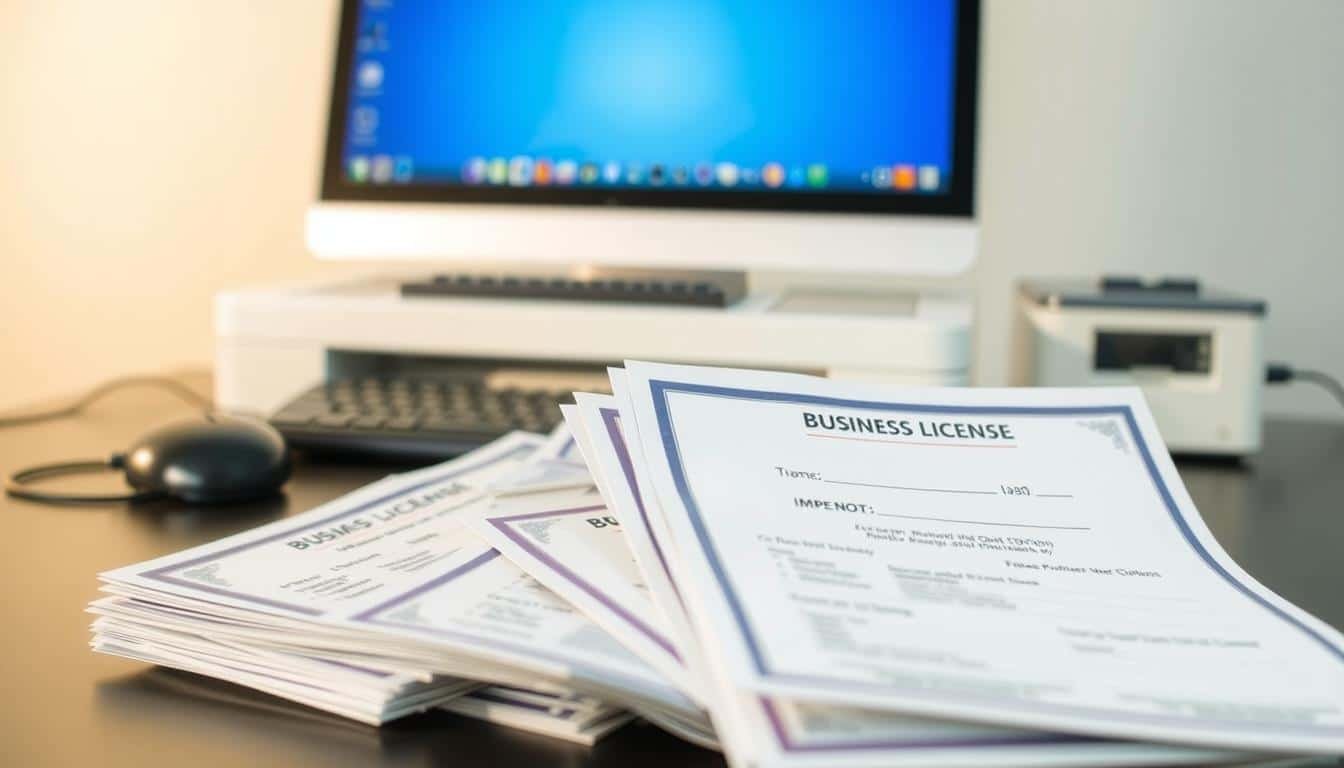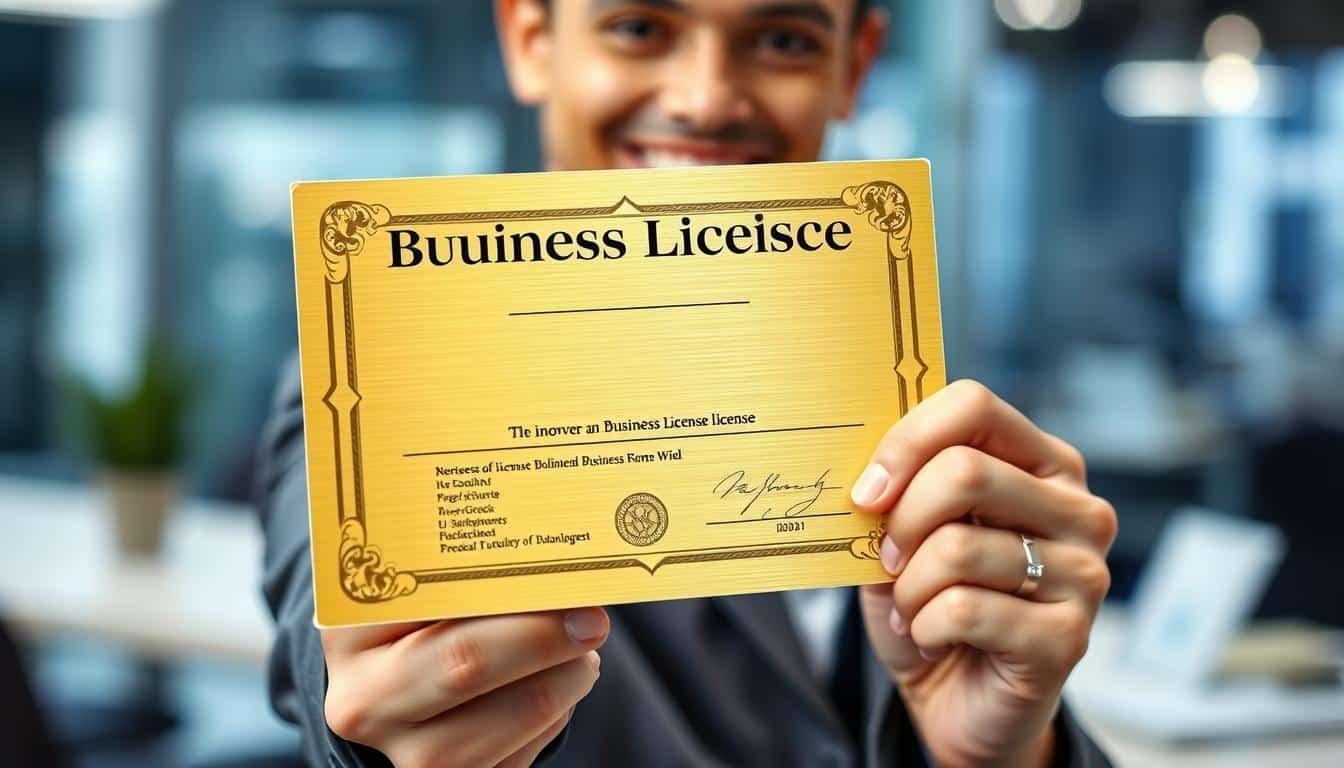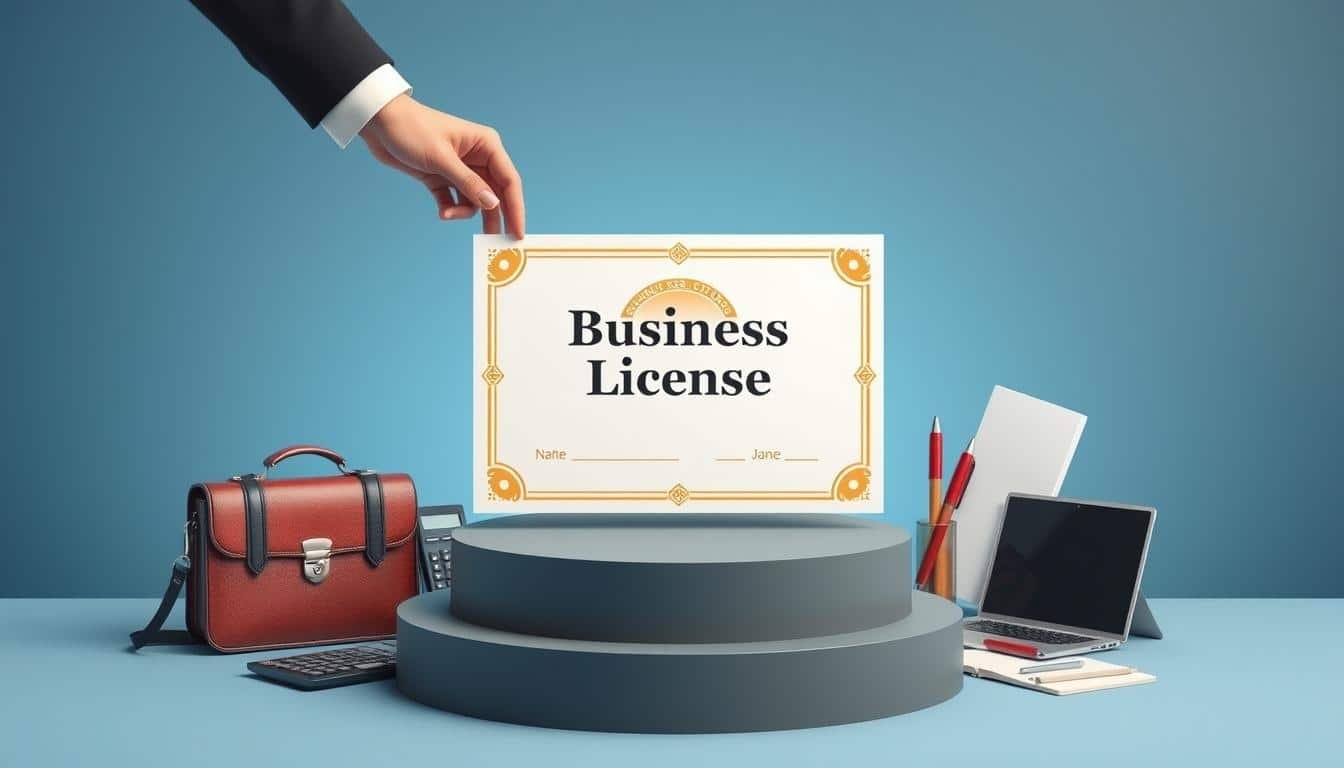Getting a business license is key for starting and running a business in the U.S. This guide will give you all the info and steps to get a business license. It makes sure your business follows federal, state, and local laws.
Key Takeaways
- Understanding the importance of business license compliance is crucial for the success and legal operation of your business.
- There are various types of business licenses you may need, including operating licenses, seller’s permits, and industry-specific licenses.
- The process of obtaining a business license typically involves forming a business entity, applying for a tax identification number, and submitting the necessary paperwork to the appropriate government agencies.
- Renewing your business license on a regular basis is essential to maintain compliance and avoid penalties or legal issues.
- Navigating the complexities of business licensing can be challenging, but this guide will provide you with the information and guidance you need to successfully obtain and maintain the necessary licenses for your business.
Understand the Importance of Business License Compliance
Keeping your business in line with business license compliance is key to success. But, it’s not easy. You have to deal with federal, state, and local agencies that set rules for businesses. Keeping up with licensing requirements and legal obligations is tough.
Why Business License Compliance is Complex
Dealing with business licenses can be tough for a few reasons:
- There are many agencies that make sure you follow the rules, based on your industry and where you are.
- Changes in your business or where it’s located might mean you need new permits or licenses.
- Remembering when to renew your licenses and staying in line can take a lot of time and effort.
The Six Steps of Business License Compliance
To handle business license compliance well, follow these six steps:
- Check what licenses and permits you already have.
- Plan out how to follow the compliance process in each place and for each type of business.
- Find out what makes you need new licensing.
- Look at the risk of not following the rules and what could happen if you don’t.
- Keep an eye on your licensing requirements and make sure you’re doing what you need to.
- Make a strong compliance plan with support from top leaders and use technology tools like CT Corporation to make things easier.
By taking these steps, businesses can handle the complex world of business license compliance. This helps avoid big fines, legal trouble, and even having to close down.
Types of Business Licenses You May Need

Running a business means dealing with many licenses and permits. You’ll need everything from basic business licenses to specific industry licenses. It’s key to know the different types to follow state, local, and federal rules. This knowledge helps you start and grow a successful business.
Business Operating License
The main license for any business is the operating license. It’s given by the state or city. This license lets you legally run your business in a certain area. It’s the base for all other licenses you might need.
Seller’s Permit
If you sell things or services, you need a seller’s permit. This lets you collect sales tax from customers. The permit comes from state tax offices and helps you pay the right amount of state and local sales taxes.
Doing Business As (DBA) or Fictitious Name Statement
Some businesses use a name that’s different from their official name. A DBA (Doing Business As) or fictitious name statement makes this official. It lets the business use the different name for marketing and other business tasks.
Special Permits
Some businesses need special permits for things like zoning, planning, building, and fire code compliance. These permits make sure the business follows local rules and is safe where it is.
Industry Licenses
Some jobs like healthcare, law, and finance need extra licenses because they’re closely watched. People in these fields must get the right industry-specific licenses to work legally.
Federal Licenses
Some businesses also need federal licenses or permits, especially in areas like alcohol, firearms, and aviation. These federal rules add to the state and local ones you already follow.
Dealing with business licenses can seem hard, but with the right info and help, you can do it. The Small Business Administration (SBA) is a great place to learn about the types of business licenses and how to get them.
business license

Getting a business license can seem hard for new entrepreneurs. But, knowing the key steps makes it easier. Whether you’re starting a small business or a big company, getting the right licenses is key.
The first step is to form your business structure and pick a company name. This could be a sole proprietorship, partnership, LLC, or corporation. After that, you need to apply for a federal Employer Identification Number (EIN) or tax ID. This number is needed for many business tasks, like opening a bank account or filing taxes.
Then, you must find out what licenses and permits you need. These vary by industry and location. It’s smart to talk to your local Small Business Administration or other experts to know what you need.
- Collect all the documents you need, like business papers, financial info, and professional certifications.
- Fill out the business license application and send it to the right agencies.
- Be ready to pay the fees, as they can change based on your business and location.
- Watch the processing timeline, as it can vary by situation.
By taking these steps and using the Small Business Administration’s resources, entrepreneurs can confidently get their business licenses. This makes sure their business follows the law from the start.
Step-by-Step Guide to Obtaining a Business License

Starting a new business is exciting, but getting a business license can be tough. With the right info and prep, you can make it easier. This ensures your business is legal and follows the rules.
Form Your Business Entity
First, decide on your business’s legal form. Will it be a sole proprietorship, partnership, limited liability company (LLC), corporation, or nonprofit organization? This choice affects the licenses and permits you’ll need.
Apply for an Employer Tax Identification Number (TIN)
After setting up your business, get an Employer Identification Number (EIN) or Tax Identification Number (TIN) from the IRS. This number is key for taxes, opening a business bank account, and hiring staff.
Determine Which Licenses You Need
- Look into the business licenses needed in your state, county, and city. These include general licenses, seller’s permits, and specific industry licenses.
- Use the Small Business Administration (SBA), Secretary of State, Department of Revenue, and local agencies to make sure you have all the right permits and licenses.
Apply for a Business License
After figuring out what licenses you need, apply to the right government agencies. You’ll have to fill out forms, provide documents, and pay fees.
Renew Your Business License
Business licenses need to be renewed yearly or as required. Keep track of renewal deadlines to avoid problems or fines.
Getting a business license is key to starting and running a successful business. Follow this guide to confidently navigate the process and stay compliant with the law.
Also Read : How Does Business Finance Support Operations?
Conclusion
Getting the right business licenses is key for any new or current business in the U.S. This article has shown how complex the licensing process can be. It depends on the industry, location, and what the business does.
Businesses need to know how important it is to follow the rules to avoid fines. Getting a business license involves several steps. These include setting up a business, getting a tax ID number, figuring out what licenses you need, applying for permits, and keeping licenses up to date.
This article has given a detailed guide to help business owners understand the licensing process. It’s vital to know about the different licenses and how to get them. This knowledge is crucial for a business to start and keep running well in the U.S.
FAQs
Q: What is the first step to get a business license?
A: The first step to get a business license is to submit a business license application to the relevant agency, which may be a county or city office. It’s important to check the municipal code for specific requirements related to your business activities.
Q: What are the common requirements for obtaining a business license?
A: Common requirements for obtaining a business license include providing your business name, details about your business location, and sometimes an inspection of your place of business. You may also need to comply with local zoning regulations.
Q: How can I apply for a business license online?
A: To apply for a business license online, visit the official website of your local finance department. They will typically have an online portal where you can complete the business license application and pay any required fees.
Q: What are the fees associated with getting a business license?
A: The fee for a business license varies depending on the municipality and the type of business you are starting. It’s advisable to check with your local finance department for the specific fees applicable to your situation.
Q: Do I need a business license if I am starting a home occupation?
A: Yes, if you are starting a home occupation, you are typically required to obtain a business license. Additionally, you may need to adhere to specific regulations set by the municipal code regarding home-based businesses.
Q: How often do I need to renew my business license?
A: Business licenses generally require renewal on an annual basis, often by January 1. However, the exact renewal schedule can vary, so it’s important to check the regulations set by your local agency.
Q: What happens if I do not get a business license?
A: Failing to obtain a required business license may result in fines, penalties, or legal action from the municipal or county agency. It is essential to comply with local laws to avoid issues with your business operations.
Q: Can I apply for a business license by mail?
A: Yes, many municipalities allow you to submit your business license application by mail. Ensure you include all required documents and the appropriate fee for a business license when mailing your application.
Q: What types of businesses require a license?
A: Various types of businesses may require a license, including contractors, retail stores, and service providers. It’s essential to check with your local agency to determine if your specific occupation requires a business license.




